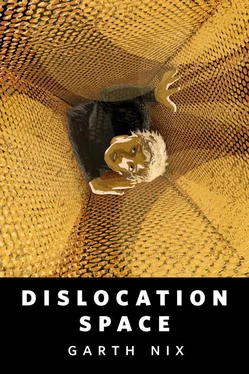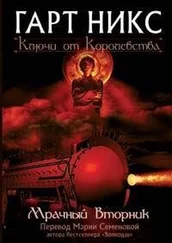Гарт Никс - Dislocation Space
Здесь есть возможность читать онлайн «Гарт Никс - Dislocation Space» весь текст электронной книги совершенно бесплатно (целиком полную версию без сокращений). В некоторых случаях можно слушать аудио, скачать через торрент в формате fb2 и присутствует краткое содержание. Город: New York, Год выпуска: 2020, ISBN: 2020, Издательство: Tor Books, Жанр: Фантастика и фэнтези, short_story, на английском языке. Описание произведения, (предисловие) а так же отзывы посетителей доступны на портале библиотеки ЛибКат.
- Название:Dislocation Space
- Автор:
- Издательство:Tor Books
- Жанр:
- Год:2020
- Город:New York
- ISBN:978-1-25076-865-0
- Рейтинг книги:4 / 5. Голосов: 1
-
Избранное:Добавить в избранное
- Отзывы:
-
Ваша оценка:
- 80
- 1
- 2
- 3
- 4
- 5
Dislocation Space: краткое содержание, описание и аннотация
Предлагаем к чтению аннотацию, описание, краткое содержание или предисловие (зависит от того, что написал сам автор книги «Dislocation Space»). Если вы не нашли необходимую информацию о книге — напишите в комментариях, мы постараемся отыскать её.
Dislocation Space — читать онлайн бесплатно полную книгу (весь текст) целиком
Ниже представлен текст книги, разбитый по страницам. Система сохранения места последней прочитанной страницы, позволяет с удобством читать онлайн бесплатно книгу «Dislocation Space», без необходимости каждый раз заново искать на чём Вы остановились. Поставьте закладку, и сможете в любой момент перейти на страницу, на которой закончили чтение.
Интервал:
Закладка:
Garth Nix
DISLOCATION SPACE

The young woman was short, not quite five feet tall, and very slight, though this was disguised by her over-sized black coat with its white patch on the shoulder, her camp identity “Kh-112” indicated there in fading blue paint. Her pale blonde hair was cut very badly, very short. It looked as if it had been hacked off with a knife, because it had been.
She carried her hat, which was little more than a bundle of stitched-together rags, and her rough padded mittens were thrust through the rope she wore in place of a belt. She had not removed the ragged wraps she wore around her hands for extra warmth, nor taken off her felt boots when she had entered the HQ hut, even though it was much warmer than outside.
It was thirty below zero outside, but the sun was up and the air was still, in camp terms a beautiful winter day. In the distance, the roll call could be heard, the guards counting the prisoners by fives in their teams before they were marched out to the forestry work area.
Two guards had brought the woman in, because that was the rule with this particular prisoner. Tough Siberian men, each twice her size and weight, but even so they kept their distance and held their plaited leather goads ready, and watched the woman as if she was something swift and venomous, to be constantly observed. They did not have their submachine guns or pistols, because that was another rule with this prisoner. She was never allowed to be within a dozen paces of a firearm.
If the guards had dared, they would have shot her and been done with it. But there were a lot of special rules about Kh-112, and one of them was that she be kept ready to be presented to important visitors from Moscow, who could turn up at any time, without notice. No one knew why this was so, or what might happen if she could not be presented, or was visibly injured or evidently maltreated. Which was to say maltreated beyond the usual scarcity of food, rest, warmth, and medicine that was the baseline of camp existence.
Anyone responsible for breaking the special rules would be forced to take the prisoner’s place in the camp. Even worse, there was the likelihood of collective responsibility: they might all be punished. This was not to be risked. All the guards, warders and trusties watched each other’s behavior with Kh-112.
None of the camp warders were in the HQ hut, which was very unusual. An abandoned game of chess, a half-eaten loaf, and a partially chewed sausage indicated they had been there until very recently, warming themselves as usual by the well-stoked stove, and had been unceremoniously kicked out. Not even the warders would leave food behind voluntarily.
Instead of the usual guards, there was only the Major, the disciplinary officer for the women’s side of the camp, who was almost unrecognizable in full uniform, complete with greatcoat, rather than her regular sheepskin coat. She too, had left her pistol behind, the holster flap at her side yawning open. But even her appearance was not the most surprising thing that day.
There was a civilian present. He still wore his thick fur coat and hat despite the heat of the room, evidently a new arrival to eastern Siberia, who did not know true cold. He was fortyish, and bald, and his eyes were weary behind his gold-framed spectacles. He sat on the only chair, looking up at Kh-112, a dossier open on his knees. Her dossier, as indicated by the faded photo pinned to the top corner.
An officer stood near the civilian, presumably of State Security, for no others ever came to the camp. But the shoulder boards on his thick, fur-collared greatcoat were a curious orange, not blue, and his rank insignia were neither of the MVD nor the Red Army. There was a large, leather suitcase by his feet and he held what at first glance looked like a small wooden crate, for oranges or perhaps lemons, but the bottom had been knocked out of it, to make it a cube open on two sides. His holster was not empty, though it was clasped shut.
The civilian spoke, his voice warm and casual, not the sharp bark of a command.
“Comrade Captain Aleksandra Vasilyevna Levchenko.”
The guards and the disciplinary officer exchanged swift, furtive glances. The zeks were never addressed as “comrade”, and most definitely never allowed any of their former ranks or titles. They were known by a letter and a number, that was all.
The young woman did not respond. She stood easily in the centre of the room, completely still, only occasionally blinking. It was hard to tell if she was even breathing.
“Comrade Captain Aleksandra Vasilyevna Levchenko.”
“She doesn’t talk, Comrade Academician,” said the Major. “She has not spoken since she arrived here. At least not to us.”
“Has she lost her wits?” asked the civilian. He sounded anxious, even upset at this possibility.
“No, sir. She simply chooses not to talk.”
“And you allow this?” asked the strange officer.
“Kh-112 is a special prisoner, under a directive from… the office of the General Secretary,” replied the Major, cautiously attributing the order to the office of the Great Man rather than to Stalin himself, just in case some revisionism was in play. Though the original orders bore Stalin’s signature this might be better forgotten. The visitors had arrived with a paper with that same signature, but all it had said was to obey their every instruction. “She does her work, she causes no trouble, we let her be.”
The Major did not mention the few occasions when new or particularly stupid guards had sought to evade the special directives, had not let Kh-112 be, and had suffered for it. But what was three or four deaths, or maybe five, when they had brought it on themselves?
“I see,” replied the civilian, who from the title accorded by the Major was perhaps a doctor, or a scientist of some kind. He addressed the prisoner again.
“Comrade, perhaps you can incline your head to acknowledge that you are in fact Comrade Captain Aleksandra Vasilyevna Levchenko?”
The prisoner nodded once, slowly.
“Parts of your dossier are missing or incomplete,” said the Academician. “Records have been destroyed by criminal elements. Errors have been made, including your arrest and sentence. Those responsible have been punished.”
The prisoner nodded once again, even more slowly.
“We have been looking for you for some time,” continued the civilian. “There is a great service you can do for the Motherland. Even more important than the work you have already done at Stalingrad, and Kursk, and the final battle for Berlin.”
The thinnest of smiles spread on the prisoner’s mouth. Everyone present knew what was what. The State needed her for something, and so her arrest and imprisonment were suddenly mistakes. If she had not been needed there would be no talk of mistakes.
“You will be compensated for your temporary absence,” continued the civilian. By “temporary absence” he meant the four years as a prisoner in the camps, first at Norilsk and now at Kolyma. “Reinstated at your rank, with full back pay.”
He hesitated for a moment.
“But the work you will do… it requires you to communicate. To talk.”
“I talk if there’s a need for it,” said Aleksandra Levchenko, with a shrug. She spoke easily, as if among friends, drinking. “Who does Koba want me to shoot now? Someone else on the Central Committee?”
The Major made a choking noise. The guards’ faces froze as if their expressions could indicate they heard nothing, knew nothing, would remember nothing. Only the Academician and the strange officer acted as if what she said was of no importance, that she should so casually call Comrade Stalin by his nickname and mention shooting members of the Politburo.
Читать дальшеИнтервал:
Закладка:
Похожие книги на «Dislocation Space»
Представляем Вашему вниманию похожие книги на «Dislocation Space» списком для выбора. Мы отобрали схожую по названию и смыслу литературу в надежде предоставить читателям больше вариантов отыскать новые, интересные, ещё непрочитанные произведения.
Обсуждение, отзывы о книге «Dislocation Space» и просто собственные мнения читателей. Оставьте ваши комментарии, напишите, что Вы думаете о произведении, его смысле или главных героях. Укажите что конкретно понравилось, а что нет, и почему Вы так считаете.







![Гарт Никс - Ангел-Маг [litres]](/books/389904/gart-niks-angel-mag-litres-thumb.webp)
![Гарт Никс - Мистер Понедельник [litres]](/books/390885/gart-niks-mister-ponedelnik-litres-thumb.webp)
![Гарт Никс - Леди Пятница [litres]](/books/433142/gart-niks-ledi-pyatnica-litres-thumb.webp)

